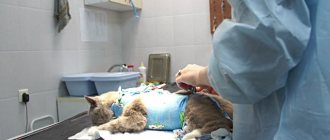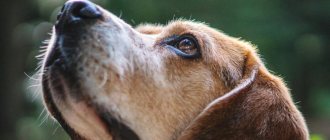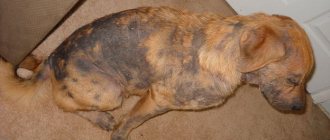What is snoring and how does it occur?
As is the case with people, snoring in dogs in itself is not a reason to panic. This phenomenon occurs quite often in dogs, which is why snoring is relatively normal for these animals (unlike cats, which normally should not snore).
You need to start worrying in cases where the animal experiences periodic respiratory arrests during sleep. This is a very bad sign. At such moments, the dog freezes for a couple of moments or even seconds, as if numb, and then takes a convulsive, deep breath.
Often, after such attacks, the dog wakes up abruptly, and in the first seconds after awakening there is pronounced panic and impaired coordination of movements, caused by a sharp exit of the central nervous system from REM/deep sleep.
It is believed that respiratory arrest is caused by retraction of the larynx. This is very dangerous, since even slight oxygen deprivation has an extremely negative effect on the condition of the heart and cerebral cortex. There are cases where people who snored heavily (and dogs, too) died from respiratory arrest.
The worst thing is when a snoring dog is severely overweight. Representatives of breeds that have rough and folded skin in the neck and chest area snore the most heavily.
Snoring as a symptom of illness
If there is a suspicion that snoring has become an unnatural manifestation for the animal, then it is better to make sure that there are no diseases. The presence of the disease may be accompanied by depression of the animal, weakness and paleness of the mucous membrane. Why a dog snores may be a symptom of the following list of diseases.
Swelling of the mucous membrane
The mucous membrane swells if the dog has had a cold. This disease can be identified by regular sneezing, nasal discharge, redness of the eyes and the release of tear fluid from the eyes. If your pet also has a cough, then this is an advanced form of the disease.
A cough indicates that swelling is present in the throat, and this is fraught with pneumonia and bronchitis. In such a situation, snoring during sleep will be observed constantly, plus characteristic wheezing will be heard.
You can help your pet with antihistamines that relieve swelling. But after this, you must visit a veterinarian. You also need to find out what provokes such a reaction.
Obesity
We cannot neglect such a fact as obesity. Even a slight excess of normal weight can become a very big problem for an animal. Excess weight puts unwanted pressure on internal organs.
Excess weight puts unwanted pressure on internal organs, which can lead to snoring.
This affects not only the respiratory processes, but also the heart, liver and metabolic processes. Organ tissues swell and lead to snoring. In such a situation, you need to balance the dog’s diet and bring his weight back to normal.
Asthma
The cause of this disease is many factors. This could be regular inhalation of smoke from cigarettes, fragrances, ecology, heart disease and many others. Asthma can be recognized by attacks of suffocation, which manifest themselves as an animal’s attempt to capture a certain amount of air.
At the same time, the dog stretches its neck and tilts its head with its mouth open. This pathology can only be treated with medications that should be prescribed by a veterinarian.
Urolithiasis disease
When blockage of the ureters occurs during illness, this promises displacement of the internal organs. The dog feels pain and also begins to snore not only in his sleep, but also when he is awake. While awake, wheezing may be heard.
The cause of snoring in a dog may be urolithiasis.
Helminths
In addition to the well-known tape-type parasites that appear in the intestines, a dog can become infected with other varieties of these organisms. There are those that spread through the blood and reach the brain and heart of the animal, damaging their structures. The appearance of parasites in the body may be accompanied by snoring.
To get rid of worms, you need to examine the animal and take urine and blood tests. In some cases, x-rays and ultrasound may be required. After this, a course of drugs is prescribed that will rid the body of parasites.
Breeds Predisposed to Snoring
This includes all dogs of brachycephalic breeds, but the real “record holders” for snoring are deservedly considered:
- English bulldogs. The “French” also snore, but often much weaker and not as impressive. The snoring of an adult English bulldog can easily be confused with the snoring of an adult.
- Pugs.
- Pekingese.
- Boxers.
In all these breeds, snoring is a congenital feature associated with the structural features of the nasal cavity. Their nose is shortened, the soft palate is enlarged and prone to sagging, the larynx is flattened and conducts air less well. Thus, for all brachycephalics, snoring is normal, and in most cases does not require visiting a veterinarian.
Congenital “ratcheting” defects in dogs of brachycephalic breeds
Unfortunately, even in the case of brachycephalics, snoring is not always normal. More precisely, the reasons that cause it may be too pronounced, and therefore cannot be done without the help of a veterinarian. Let's take a closer look at some typical abnormalities of brachycephalic dogs.
Nostril stenosis
Steonsis in this case is the process of thickening and coarsening of the tissues lining the inside of the nasal cavity and the nostrils themselves. This is one of the main causes of snoring, since the narrowing of the respiratory lumen inevitably causes difficulty in the passage of air through it.
Presumably, stenosis in these dogs is a congenital phenomenon, due to genetic predisposition and peculiarities of their anatomical structure. Studies show that stenosis to one degree or another occurs in more than 70% of dogs with a brachycephalic skull structure.
As a rule, there is nothing wrong with this, but in cases where stenosis is a consequence of a previous pathology of inflammatory origin, or it has developed against the background of a chronic infection, it can be dangerous. In particular, severe respiratory failure may develop, which can subsequently lead to respiratory arrest and death of the pet.
Treatment can be conservative, but only in the mildest cases. In this case, the dog is prescribed anti-inflammatory corticosteroids. But usually there is no special effect from such treatment, and therefore sooner or later you have to undergo surgery. During the intervention, overgrown tissue is cut off, and laser resurfacing is possible (a more expensive but less traumatic option).
Tracheal hypoplasia
This is a congenital, genetically determined defect, characteristic specifically for brachycephals. It is characterized by uneven and slow growth of tracheal rings; in severe cases, underdevelopment of most of them is observed.
Dogs have been described in which the trachea was so underdeveloped that the organ more closely resembled the esophagus. Of course, such animals, without appropriate veterinary care, died quite quickly, since their bodies did not receive enough oxygen.
At the initial stage, hypoplasia manifests itself precisely as snoring, which quickly intensifies over time. After a few months or a couple of years, the dog develops severe respiratory failure. A sick animal breathes heavily, with wheezing and whistling, and is completely unable to tolerate even the lightest physical exertion.
In some cases, treatment is not required, since in some animals the trachea returns to normal during the growth period. In other situations, surgical correction of the organ is recommended, since drug treatment is ineffective.
How to deal with dog snoring
If the examination shows that the pet is healthy, but nevertheless continues to snore, it is necessary to analyze the dog’s living conditions.
Review your pet's diet and put it on a diet if necessary. In addition, take measurements of the air humidity and temperature in the room where the dog lives: sometimes snoring is caused by excessively dry air. Pay attention to the position during sleep: to stop the animal from snoring, sometimes it is enough to put it on its side with its legs extended.
Also pay attention to the place where the animal walks. Perhaps there are flowers and grass growing there that cause allergies in the dog. In addition, sometimes allergies can be caused by household chemicals used to treat bedding and toys, low-quality plastic from which bowls are made, and other animal accessories.
So, we found out why a dog snores and what to do about this problem. As you can see, the causes of snoring can be both harmless and quite dangerous. In order not to guess and waste precious time, it is best to show the dog to a veterinarian, conduct the necessary examinations, and get tested. In this way, you can exclude a dangerous disease, look for physiological causes of snoring, and, if a disease is present, begin its treatment in a timely manner.
Causes of snoring in dogs of other breeds
Of course, all of the above pathologies can also occur in representatives of other breeds with a normal skull structure. But this doesn't happen often. In “normal” dogs, snoring develops for other reasons, including quite dangerous pathologies.
Tracheal collapse
A very severe and dangerous pathology, one of the first signs of which is snoring. By the way, pugs are highly susceptible to the disease. Other brachycephalic breeds are not predisposed to collapse (but are susceptible to hypoplasia of the same organ). Practice proves that the chances of getting sick are significantly higher among representatives of small breeds:
- Small and miniature poodles.
- Chihuahua.
- Small varieties of terriers.
- And also pinschers (also small types).
By “collapse” we mean a narrowing of the trachea, whereas normally its lumen should always be maintained! The cartilaginous rings that create the skeleton of this tubular organ are responsible for this. The essence of tracheal collapse is that the rings begin to fall off. If you imagine a cut organ in a transverse view, then the cut will be almost round. At the fourth stage of collapse, the same section looks more like a strongly compressed and elongated number 0. Air almost does not pass through such a trachea, the dog will probably die from suffocation.
In the first stage, the only symptom may be gradually increasing nighttime snoring. There is only one effective treatment - an expensive surgical operation, during which damaged rings are either replaced with implants (ideal option), or the lumen of the trachea is maintained by inserting a special metal “sleeve”.
Other causes of snoring
In veterinary practice, there are other reasons for the development of snoring in dogs with a “correct” skull:
- Obese animals snore very often. With excess body weight, the cardiovascular system suffers greatly.
- Accordingly, snoring may be a sign of “ordinary” pathologies of the blood vessels, heart and lungs.
- It has been observed that dogs often snore in hot and stuffy rooms with dry air. It happens that installing the simplest and cheapest air humidifier helps to cope with an unpleasant phenomenon.











